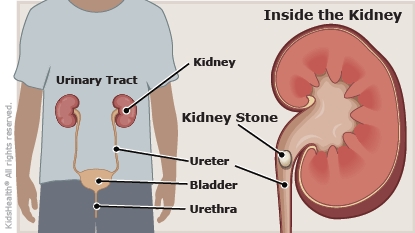Kidney Stones
Article Translations: (Spanish)
What Are Kidney Stones?
Kidney stones happen when minerals form crystals inside the kidneys. Then they get bigger and become kidney stones. Kidney stones can move into the urinary tract. There, they can cause problems like pain and blood in the urine (pee). Some stones also can block the flow of pee.
Most kidney stones pass out of the body without causing any damage. Pain medicine and plenty of fluids help most kids with kidney stones get better.
What Are the Signs & Symptoms of Kidney Stones?
Usually, kidney stones don't cause symptoms until they move around in the kidney or pass into the ureter (the muscular tube that connects the kidney to the bladder). Small stones can pass out of the body with little or no pain.

Larger stones in the urinary system may get stuck and cause symptoms like:
- pain, which usually:
- starts in the side or back
- spreads to the lower belly and groin as the stones move through the urinary tract
- comes and goes in waves
- blood in the pee (hematuria)
- nausea and vomiting
- needing to pee often or urgently
- fever or chills (signs of a possible infection)
Sometimes, a stone that's too big to move can create a backup of pee. This can make one or both kidneys swell, causing pain in the side and back. If it's not treated, it may cause long-term kidney damage.
What Causes Kidney Stones?
Most kids who get kidney stones have a health condition that increases their risk for them. These include:
- some medicines
- special diets, like a ketogenic diet that is sometimes used to prevent seizures
- obesity
- problems with how the urinary tract is formed
- metabolic disorders (problems with how the body breaks down and uses food)
- gout (a type of arthritis)
- other kidney conditions
- conditions that affect the thyroid or parathyroid gland
- some urinary tract infections (UTIs)
Other things that can make a kidney stone more likely are:
- not drinking enough water
- eating too much salt
- not having enough citric acid (the acid in citrus fruits such as oranges) in the urine
- having too much calcium in the urine
Kidney stones mostly affect adults. But kids and teens can get them.
Some types of kidney stones run in families, so having a relative with kidney stones can make a person more likely to get them. Kids who have had kidney stones before are more likely to get them again.
How Are Kidney Stones Diagnosed?
The doctor will ask about:
- the symptoms and how long they've been going on
- your child's diet
- whether your child could be dehydrated
- whether there's a family history of kidney stones, or urinary or kidney problems
The doctor will do an exam and probably order:
- blood tests
- urine tests
- kidney function tests
- imaging tests, such as ultrasounds, X-rays, or CT scans. These can show a stone's exact size and location. This helps doctors decide on the best treatment.
How Are Kidney Stones Treated?
Treatment depends on the type of kidney stone and its size. Some kids only need to drink a lot of water and take pain medicines to pass a kidney stone. Those with larger stones may need surgery or other treatments to help remove the stones.
There are different types of stones. A stone that passes in pee and is caught in a strainer can be tested to see what type it is. Knowing that can help doctors find the cause and offer advice how to treat it and prevent other stones.
Home Treatment
To help pass a small stone, give your child plenty of water to drink and medicine to ease the pain. Often, over-the-counter medicines such as ibuprofen and acetaminophen are enough. But sometimes, doctors prescribe pain medicine.
The doctor might ask you to strain your child's pee for a few days to collect the kidney stones. Examining them can help the doctor decide if your child needs more treatment.
Hospital Treatment
Kids whose kidney stones block the urinary tract or cause severe pain or dehydration may need care in a hospital. They might get intravenous (IV) fluids and pain medicine to help the stones pass and treat dehydration.
Large stones rarely pass on their own. To get rid of large stones and stones that are damaging the kidneys, doctors can do a procedure to break up the stone. This lets the smaller pieces pass on their own or be removed with a scope or surgery.
Can Kidney Stones Be Prevented?
It's not always possible to prevent some types of kidney stones.
But all kids who've had kidney stones should:
- Drink a lot of liquids (water is best) throughout the day. Avoid dark sodas, soft drinks, and sports drinks. If their pee is almost clear, that's a sign they're drinking enough. Ask your doctor how much your child should drink.
- Limit the salt and protein in their diet.
If dietary changes don't prevent kidney stones, medicines can help. Depending on the type of kidney stone your child had, the doctor can prescribe treatments or medicines to lower the levels of crystal-forming substances in the pee.
Doctors will keep an eye on kids who have had kidney stones and try to prevent new ones. The doctor might have your child use a 24-hour urine collection test. This measures the volume of pee within a 24-hour period and checks what's in it.
Note: All information is for educational purposes only. For specific medical advice, diagnoses, and treatment, consult your doctor.
© 1995-2024 KidsHealth ® All rights reserved. Images provided by iStock, Getty Images, Corbis, Veer, Science Photo Library, Science Source Images, Shutterstock, and Clipart.com

